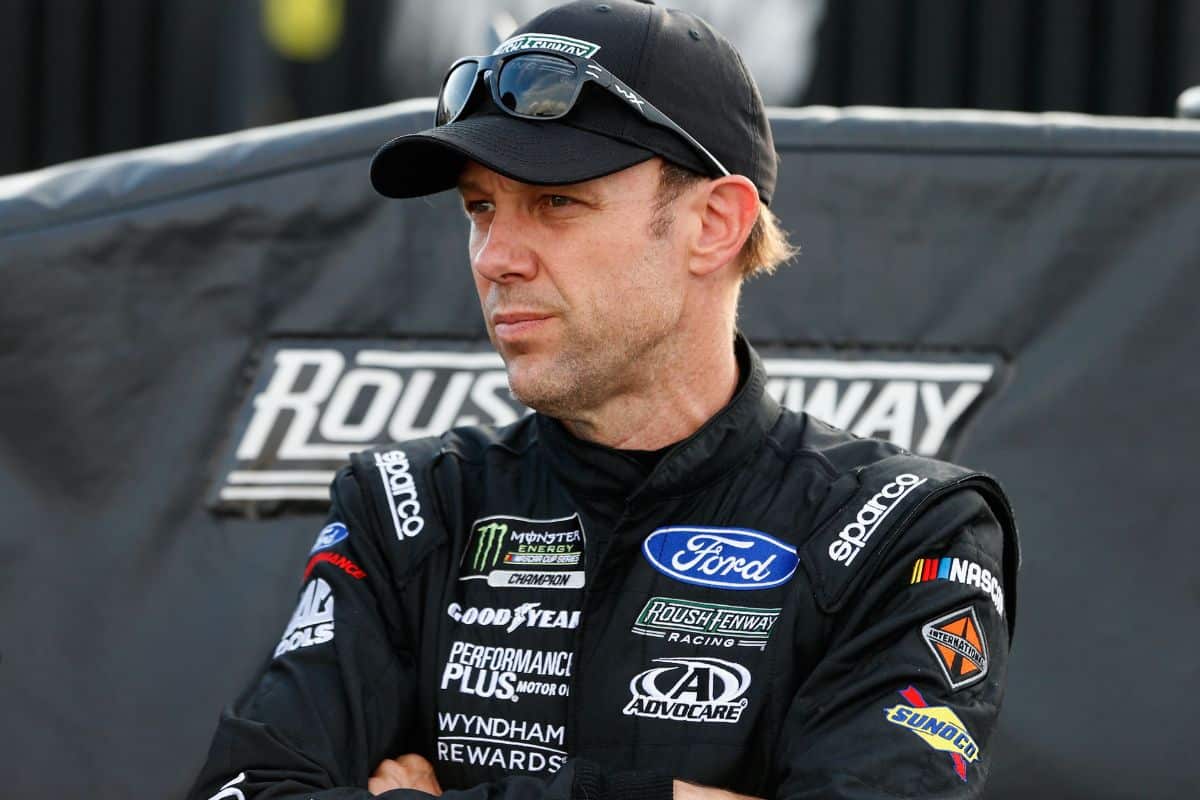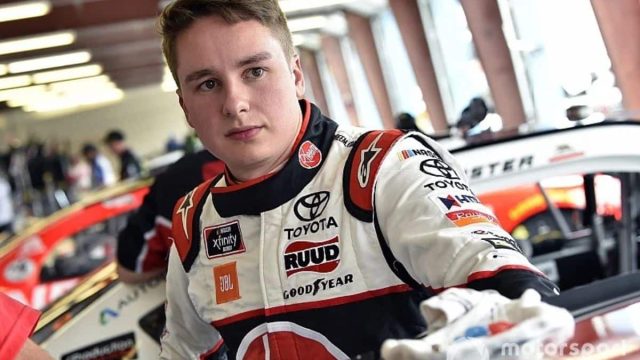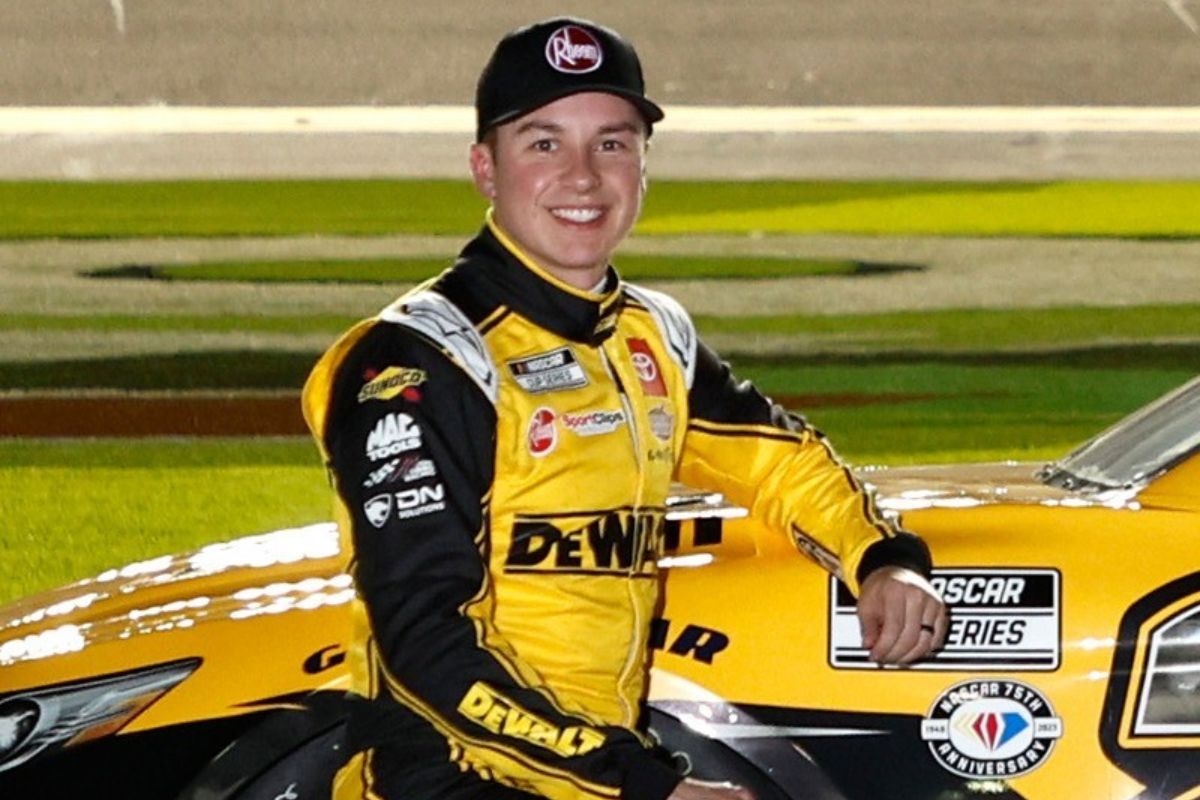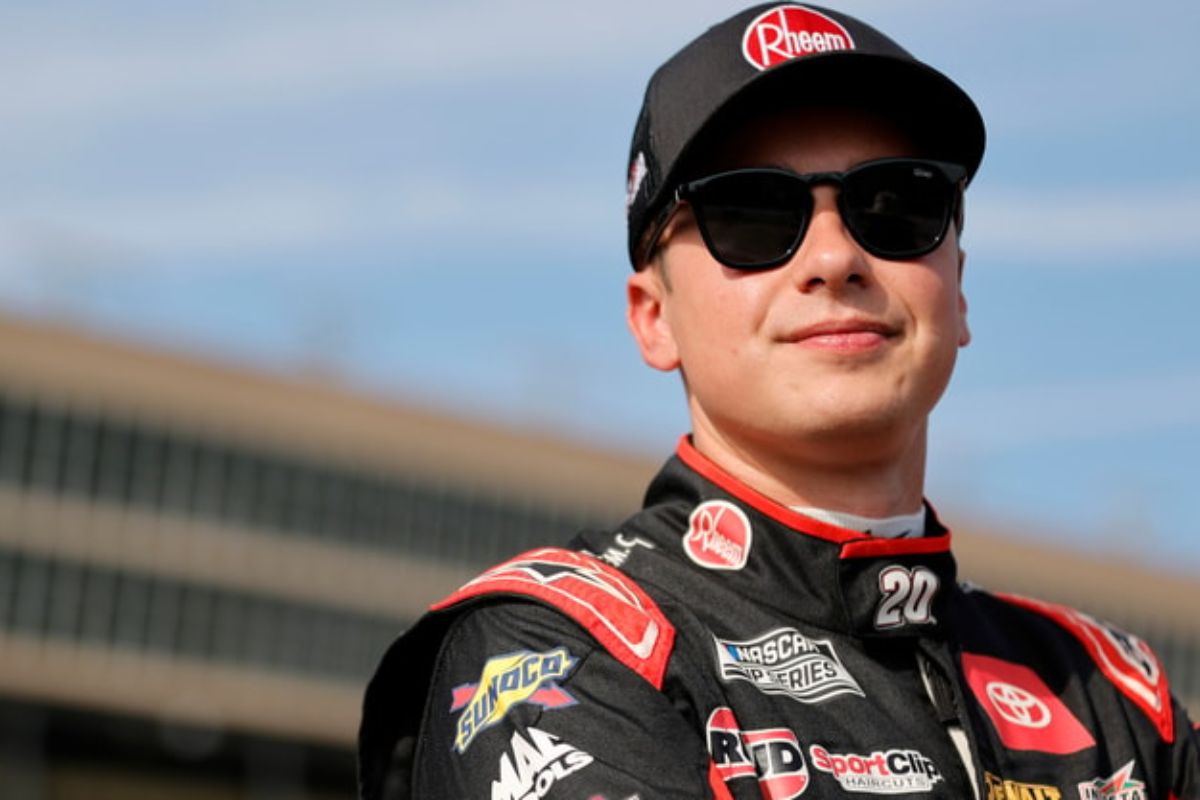Christopher Bell Warns Toyota: Christopher Bell‘s recent near-victory at Gateway has cast a spotlight on Toyota‘s ongoing technical challenges, as his commanding lead was abruptly halted by a car malfunction. This incident highlights a recurring issue for Toyota and emphasizes the urgent need for introspection and resolution. Bell’s experience echoes similar frustrations felt by other drivers, such as Matt Kenseth, pointing to a potential endemic problem within the manufacturer’s racing division.
Key Highlights
- Christopher Bell’s promising Gateway performance was halted by a car malfunction, raising concerns about Toyota’s reliability.
- Bell’s car suffered a broken exhaust valve, highlighting systemic technical issues within Toyota.
- Historical reliability struggles have plagued Toyota in NASCAR, affecting top drivers at Joe Gibbs Racing.
- Bell’s setback echoes past technical challenges Toyota faced with engines in the 2013 season.
- Addressing these recurring issues is crucial for Toyota to maintain its competitive edge in NASCAR.
Christopher Bell’s Dominance and Sudden Setback
Christopher Bell’s commanding performance last Sunday, characterized by his victories in both stages, came to an abrupt halt just 17 laps from the finish line. The race, held at Gateway, saw Bell in his No. 20 Toyota car, dominate the track, laying down laps with precision and speed that left his competitors in the dust. His performance was a proof of his skill and the finely-tuned machine beneath him, as he effortlessly clinched both stage wins.
Bell’s sudden setback was as shocking as it was inexplicable. The crowd, who had been reveling in his apparent march toward victory, watched in stunned silence as his vehicle inexplicably slowed. The atmosphere shifted from one of excitement to confusion, as fans and team members struggled to comprehend what had gone wrong.
Crew chief Adam Stevens mirrored the collective bewilderment, stating, ‘There’s just no way to tell right now.’ His words encapsulated the frustration and helplessness felt by the team. Despite the setback, Bell’s dominance on the track cannot be understated. His ability to dominate the stages highlighted both his personal talent and the potential of his vehicle, making the sudden malfunction all the more disheartening.
Toyota’s Technical Troubles Unveiled
Toyota’s recent struggles with technical reliability have come into sharper focus following the unexpected failure of Christopher Bell’s No. 20 car at the Gateway race. Despite being on a hot streak this season with six wins and closely trailing behind the Chevrolets, Toyota’s persistent technical issues have cast a shadow over their performance.
The Enjoy Illinois 300 at Gateway was particularly revealing, as Bell’s car suffered a broken exhaust valve, jeopardizing both his race and the team’s momentum. The No. 20 team’s immediate response was to download and analyze the car’s data before leaving the Gateway circuit. Upon returning the car to the shop for a detailed diagnosis, the critical failure was confirmed on Monday.
While Bell’s skill and quick thinking prevented a catastrophic failure and a Did Not Finish (DNF) outcome, the incident highlighted a deeper, systemic issue that could undermine Toyota’s competitive edge. Bell’s frustration is understandable. The 28-year-old driver narrowly avoided what could have been a disastrous end to an otherwise promising race.
The broken exhaust valve incident is not an isolated occurrence, but part of a pattern of technical glitches that have plagued Toyota’s performance this season. These technical issues, if not promptly addressed, could derail the team’s trajectory and erode the confidence of its drivers and supporters.
Bell’s Concerns and Toyota’s History
Bell’s concerns are rooted not only in the recent technical troubles but also in Toyota’s historical struggles with reliability, highlighting a recurring issue that has previously hampered the team’s performance. Reflecting on the past, Bell’s alarm stems from a well-documented pattern of mechanical failures that have plagued Toyota’s NASCAR endeavors.
During a recent interview with Bob Pockrass, Bell recounted how engine issues emerged prominently in 2022. Despite Bell’s commendable performance, marked by the highest number of top-fives and top-tens within the Joe Gibbs Racing team, his teammates, including seasoned driver Denny Hamlin, frequently encountered engine failures, power steering issues, and broken drivetrains.
“We broke a valve spring, yes. And we haven’t had valve spring problems for a long period of time. I think it was 2022, we did have a rough go of it with the valve springs. But we haven’t seen that in a period of time now. So I think, they think too that it was just a random part failure and we’re not expecting any more of it.” – Bell
Christopher Bell said it was a broken valve spring that resulted in the engine going sour at Gateway. He said they believe it is a random part failure. pic.twitter.com/2RvUbANk6C
— Bob Pockrass (@bobpockrass) June 6, 2024
This historical context magnifies Bell’s current concerns, as it emphasizes a systemic problem that has yet to be fully addressed. The recurrence of such reliability issues casts a shadow over Toyota’s otherwise competitive racing program, raising questions about the durability and consistency of their engineering solutions. Bell’s success, contrasted against his teammates’ mechanical misfortunes, exemplifies the discrepancy in performance outcomes that can be attributed to these technical failures.
Furthermore, the persistence of these issues suggests that Toyota’s engineering and technical teams must explore deeper into the root causes of these failures. The stakes are undeniably high in NASCAR, where split-second decisions and mechanical integrity can make the difference between victory and defeat.
Christopher Bell’s Reaction and Optimism
Amidst the sting of a narrowly missed victory, Bell’s sincere reflections reveal a blend of frustration and steadfast optimism about the future. The palpable disappointment in his voice was evident as he honestly remarked.
“I mean, that one’s gonna sting for a while because the car was obviously amazing, we had great pace and the win was right in front of us. So you don’t wanna let that one get away. But you know, we had a great day. We were still able to salvage a lot of wins out of it, so yeah, I’m confident we’ll be fast.” – bell
Bell’s frustration stems from the clear potential his car exhibited. The performance of his Toyota, brimming with speed and precision, stood as proof of the team’s hard work and strategic skill. The loss, therefore, was not simply a missed opportunity but a moment where the combination of skill and technology fell short of its ultimate reward.
However, Bell’s narrative did not end on a note of despair. His ability to pivot from disappointment to a focus on the positives speaks volumes about his maturity and resilience as an athlete. ‘But you know, we had a great day. We were still able to salvage a lot of wins out of it, so yeah, I’m confident we’ll be fast,’ he added. This statement reflects his firm belief in the team’s capabilities and the potential for future successes.
Matt Kenseth’s Similar Experience
Matt Kenseth’s career with Toyota offers a compelling parallel, marked by both victories and the frustration of technical setbacks. When Kenseth joined Joe Gibbs Racing in 2013, he brought a wealth of experience and a winning pedigree. However, the challenges he encountered with Toyota’s technical reliability often overshadowed his potential for success on the track.
In the early part of 2013, Toyota faced a significant crisis, losing 17 engines during the initial 13 races. This was a period of immense frustration for drivers, including Kenseth, who saw their competitive edge blunted by mechanical failures. Kenseth himself experienced multiple engine issues, a situation that echoed the broader struggles within the Toyota camp. Such setbacks were not new; Toyota’s history with Joe Gibbs Racing has been tainted by recurring technical problems, dating back to 2009 when TRD president Lee White issued a public apology for engine wear issues.
I mean I feel like JGR (Joe Gibbs Racing) has three of the strongest teams in the garage. It seems like we got the best cars out there – or equal to the best cars. But, you know you have to finish these things.” He added, “From a driving standpoint, I mean I can’t be any easier on it then I’ve been on it, so something is wrong. It’s not driver-induced. It’s not too many miles in practice. It’s nothing like that. Something wrong with a part and it broke.” – Kenseth
The technical woes continued, affecting not just Kenseth but a roster of accomplished drivers like Kyle Busch, Martin Truex Jr., and Bobby Labonte. The cumulative effect was a sense of uncertainty and diminished confidence in Toyota’s reliability under race conditions. Despite these hurdles, Kenseth managed to secure notable victories, showcasing his resilience and skill.
Christopher Bell’s recent challenges with Toyota are a reminder of the brand’s historical struggles. The parallels between Kenseth’s and Bell’s experiences highlight a persistent issue that Toyota must address. For Joe Gibbs Racing, the hope remains that lessons from the past will inform better strategies and solutions, allowing their drivers to compete without the shadow of mechanical failure looming over their aspirations.

News in Brief: Christopher Bell Warns Toyota
The incident at Gateway, where Christopher Bell’s potential victory was highlighted by a car malfunction, emphasizes the critical need for Toyota to address underlying technical vulnerabilities.
This episode not only brings to light systemic reliability issues but also strengthens the importance of rigorous technical scrutiny and improvements.
Bell’s reaction, combined with historical precedents like Matt Kenseth’s experiences, stresses the urgency for Toyota to improve their technical robustness to maintain competitive performance in future races.
Our Reader’s Queries
Q. How much does Christopher Bell earn?
A. As of 2023, Christopher Bell commands an annual salary of $850,000.
Q. What car is Christopher Bell?
A. With a commendable track record, Christopher Bell pilots the No. 20 Toyota Camry for Joe Gibbs Racing. In the upcoming 2024 NASCAR Cup Series season, Bell will continue to represent Joe Gibbs Racing behind the wheel of the No. 20 Toyota Camry.
ALSO READ: Christopher Bell Reveals The Truth Behind WWT Raceway Heartbreak


